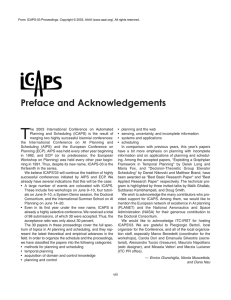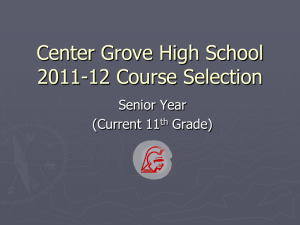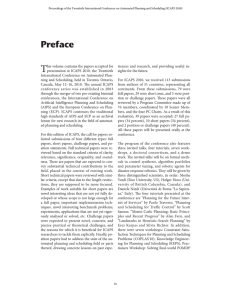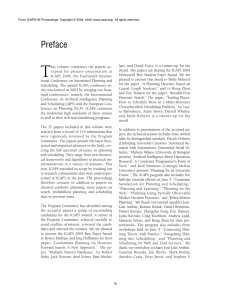Contents Methods for Planning and Scheduling
advertisement
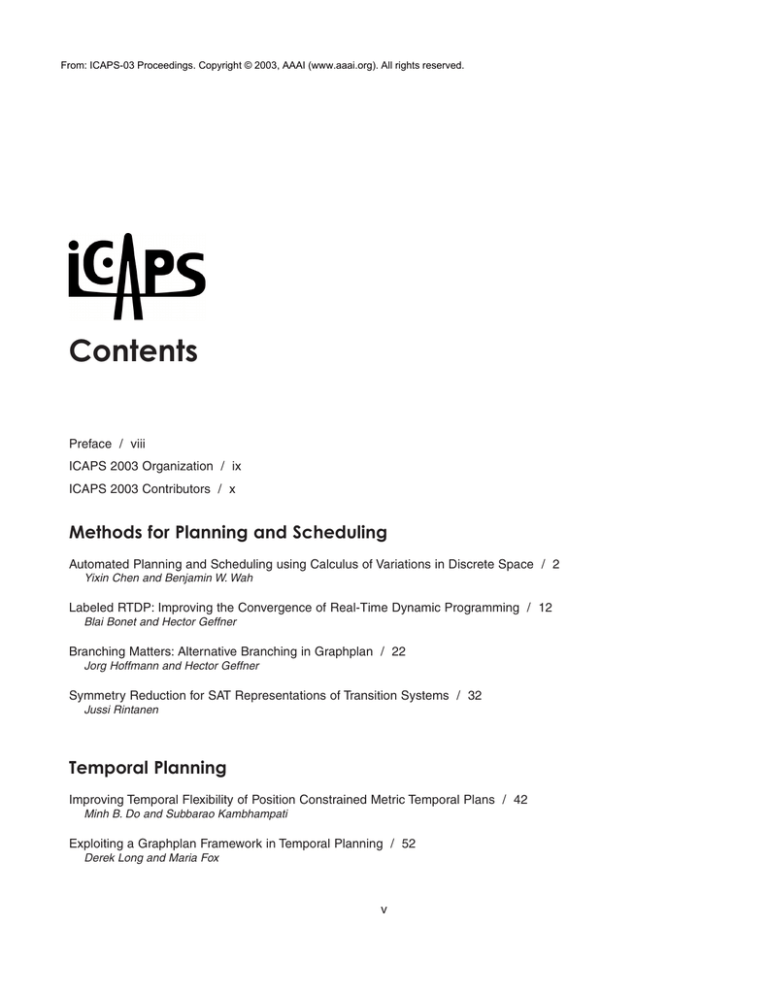
From: ICAPS-03 Proceedings. Copyright © 2003, AAAI (www.aaai.org). All rights reserved. Contents Preface / viii ICAPS 2003 Organization / ix ICAPS 2003 Contributors / x Methods for Planning and Scheduling Automated Planning and Scheduling using Calculus of Variations in Discrete Space / 2 Yixin Chen and Benjamin W. Wah Labeled RTDP: Improving the Convergence of Real-Time Dynamic Programming / 12 Blai Bonet and Hector Geffner Branching Matters: Alternative Branching in Graphplan / 22 Jorg Hoffmann and Hector Geffner Symmetry Reduction for SAT Representations of Transition Systems / 32 Jussi Rintanen Temporal Planning Improving Temporal Flexibility of Position Constrained Metric Temporal Plans / 42 Minh B. Do and Subbarao Kambhampati Exploiting a Graphplan Framework in Temporal Planning / 52 Derek Long and Maria Fox v Local Search Techniques for Temporal Planning in LPG / 62 Alfonso Gerevini, Ivan Serina, Alessandro Saetti, and Sergio Spinoni Acquisition of Domain and Control Knowledge Localizing Planning with Functional Process Models / 73 J. William Murdock and Ashok K. Goel Learning Rules for Adaptive Planning / 82 Dimitris Vrakas, Grigorios Tsoumakas, Nick Bassiliades, and Ioannis Vlahavas GIPO II: HTN Planning in a Tool-supported Knowledge Engineering Environment / 92 T. L. McCluskey, D. Liu, and R. M. Simpson GPT Meets PSR / 102 Blai Bonet and Sylvie Thiebaux Planning and Control Synthesis of Hierarchical Finite-State Controllers for POMDPs / 113 Eric A. Hansen and Rong Zhou Guided Symbolic Universal Planning / 123 Rune M. Jensen, Manuela M. Veloso and Randal E. Bryant Decision-Theoretic Group Elevator Scheduling / 133 Daniel Nikovski and Matthew Brand Reasoning about Autonomous Processes in an Estimated-Regression Planner / 143 Drew McDermott Planning and the Web The Role of Planning in Grid Computing / 153 Jim Blythe, Ewa Deelman, Yolanda Gil, Carl Kesselman, Amit Agarwal, Gaurang Mehta, and Karan Vahi Recommendation as a Stochastic Sequential Decision Problem / 164 Ronen Brafman, David Heckerman, and Guy Shani Planning for Marketing Campaigns / 174 Qiang Yang and Hong Cheng Sensing, Uncertainty, and Incomplete Information Expressive Equivalence of Formalisms for Planning with Sensing / 185 Jussi Rintanen vi A Framework for Planning in Continuous-time Stochastic Domains / 195 Håkan L. S. Younes, David J. Musliner, and Reid G. Simmons Conformant Probabilistic Planning via CSPs / 205 Nathanael Hyafil and Fahiem Bacchus A Framework for Planning with Extended Goals under Partial Observability / 215 Piergiorgio Bertoli, Alessandro Cimatti, Marco Pistore, and Paolo Traverso Planning and Scheduling Systems and Applications SOFIA`s Choice: Scheduling Observations for an Airborne Observatory / 226 Jeremy Frank and Elif Kurklu A Multi-Heuristic GA for Schedule Repair in Precast Plant Production / 236 Weng-Tat Chan and Tan Heng Wee A Multi-Agent System-driven AI Planning Approach to Biological Pathway Discovery / 246 Salim Khan, William Gillis, Carl Schmidt, and Keith Decker A Mixed-initiative Framework for Robust Plan Sketching / 256 Karen L. Myers, Peter A. Jarvis, W. Mabry Tyson, and Michael J. Wolverton Scheduling Vehicle Routing and Job Shop Scheduling: What`s the Difference? / 267 J. Christopher Beck, Patrick Prosser, and Evgeny Selensky Quality and Utility — Towards a Generalization of Deadline and Anytime Scheduling / 277 Thomas Schwarzfischer Optimal Rectangle Packing: Initial Results / 287 Richard E. Korf Economically Augmented Job Shop Scheduling / 296 Wolfram Conen Index / 305 vii Preface and Acknowledgements • • • • planning and the web sensing, uncertainty, and incomplete information systems and applications scheduling In comparison with previous years, this year’s papers have a bit more emphasis on planning with incomplete information and on applications of planning and scheduling. Among the accepted papers, "Exploiting a Graphplan Framework in Temporal Planning" by Derek Long and Maria Fox, and "Decision-Theoretic Group Elevator Scheduling" by Daniel Nikovski and Matthew Brand, have been awarded as "Best Basic Research Paper" and "Best Applied Research Paper" respectively. The technical program is highlighted by three invited talks by Malik Ghallab, Subbarao Kambhampati, and Doug Smith. We wish to acknowledge the many contributors who provided support for ICAPS. Among them, we would like to mention the European network of excellence in AI planning (PLANET) and the National Aeronautics and Space Administration (NASA) for their generous contribution to the Doctoral Consortium. We would like to acknowledge ITC-IRST for hosting ICAPS'03. We are grateful to Piergiorgio Bertoli, local organizer for the Conference, and all of the local organization staff, especially Marco Benedetti (coordinator for the workshops), Carola Dori and Emanuela Silvestris (secretariat), Alessandro Tuccio (treasurer), Maurizio Napolitano (web designer), and Micaela Vettori and Marzia Lucianer (ITC PR office). he 2003 International Conference on Automated Planning and Scheduling (ICAPS) is the result of merging two highly successful biennial conferences: the International Conference on AI Planning and Scheduling (AIPS) and the European Conference on Planning (ECP). AIPS was held every other year beginning in 1992, and ECP (or its predecessor, the European Workshop on Planning) was held every other year beginning in 1991. Thus, despite its new name, ICAPS-03 is the thirteenth in the series. We believe ICAPS’03 will continue the tradition of highly successful conferences initiated by AIPS and ECP. We already have several indications that this will be the case: • A large number of events are colocated with ICAPS. These include five workshops on June 9–10, four tutorials on June 9–10, a System Demo session, the Doctoral Consortium, and the International Summer School on AI Planning on June 14–20. • Even in its first year under the new name, ICAPS is already a highly selective conference. We received a total of 98 submissions, of which 30 were accepted. Thus, the acceptance ratio was only about 30 percent. The 30 papers in these proceedings cover the full spectrum of topics in AI planning and scheduling, and they represent the latest theoretical and empirical advances in the field. In order to organize the schedule and the proceedings, we have classified the papers into the following categories: • methods for planning and scheduling • temporal planning • acquisition of domain and control knowledge • planning and control T — Enrico Giunchiglia, Nicola Muscettola, and Dana Nau viii
